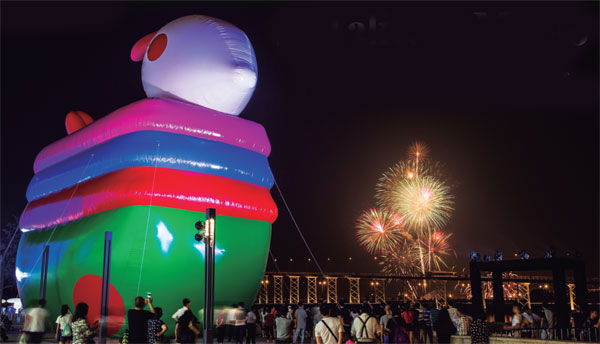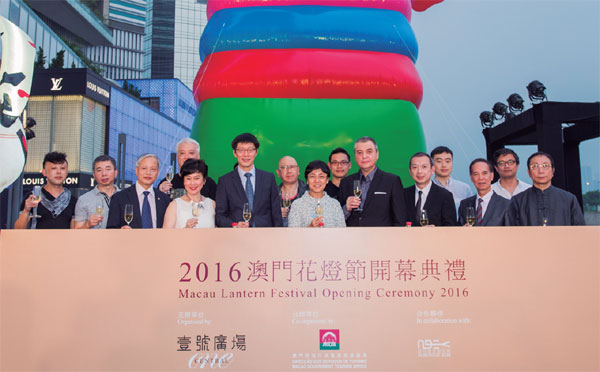Rabbit lantern tradition still alive in Macao
Updated: 2016-09-15 08:01
By Feliks Cheang in Macao(HK Edition)
|
|||||||||
|
An inflatable rabbit balloon sculpture, designed by architect-artist Carlos Marreiros from Macao, is placed at the waterfront promenade of One Central Macau for Mid-Autumn Festival, a traditional Chinese festival featuring lanterns and family reunions. Photos provided to China Daily |


Architect-artist discusses his enduring love for Macanese culture and explains the unique place lanterns still have in it.
Carlos Marreiros, an architect-artist from Macao, has designed over 40 illuminated rabbit lanterns, which whimsically hang along a promenade in the former Portuguese enclave by the tranquil Nam Van Lake.
He says: "The rabbit as an animal doesn't touch me much. I only love cats and dogs - I have seven cats. What I like is the lanterns - the bunny lanterns."
Marreiros, 59, has been creating rabbit lanterns, on and off, since his luminous "Little Rabbit Lantern" Macau Pavilion for the Shanghai World Expo in 2010.
Born and bred in Macao, Marreiros is not only a local architect and artist who has built a number of world-class contemporary structures in the city. Marreiros is also a poet and a cultural conservationist.
Lanterns play an important role in the long history of Chinese culture. Chinese lanterns are the earliest portable lighting devices invented in the Western Han Dynasty (206 BC - 9 AD).
Lanterns later became the symbol of festivity in Chinese culture, especially the Mid-Autumn Festival. They also symbolize the prosperity of a family, as the words "lanterns" (deng) and "man" (ding) share similar pronunciations. Chinese at all levels of society share a special affinity for lanterns.
"Chinese, Portuguese and Macanese - everyone played with these lanterns." They are rooted in Marreiros' childhood nostalgia for the city.
"When I was a kid I used to lark around during the Mid-Autumn Festival with bunny lanterns, so did my grandfather and children. People carried them onto the streets on their way to moon-watching parties or family reunions," he recalls with a smile.
"From time to time, lanterns have many forms, from money to manga characters, from paper to plastic and electronic ones; but the paper-and-silk little rabbit is the most traditional," said Marreiros.
The rabbit lantern is made with a bamboo structure and wrapped in ribbons of rice paper. It is then mounted on four small wooden wheels. Such an old craft, regrettably, has faded away in its birthplace - yet it was still maintained in Macao. "A few craftsmen at Rua da Palha still make traditional lanterns," he added.
Macao has been dubbed a "lotus ground" because it has been blessed, secure and stable. The legacy of its fine traditional art still remains, adding to the city's charms.
Invited by One Central, a waterfront flagship mall in Macao, the architect hopes that the symbolism at the root of his work can revitalize the local craft, or at least, invoke memories of the past.
Building lanterns with syntactic silk to make them more durable, he invited artists from Macao and Beijing to decorate the lanterns, providing each sculpture with an artistic interpretation and personal design. They ranged from traditional Chinese landscapes to classical Portuguese jewelry metalwork filigree, from Chinese auspicious symbols to Western abstract graphics. Whether it is his handmade lanterns, his family, his hometown, and even Marreiros himself, there are clear signs of East meeting West.
Marreiros has an interracial heritage - his mother is Eurasian, and his father is European. His work is always inspired by Macao's unusual mix of Portuguese, Chinese and Macanese heritage.
His maternal family has lived in Macao for two centuries, and he is a quintessential Macanese. Raised in Macao, he studied in Portugal, German and Sweden before returning in 1983 and participating in drafting regulations of heritage preservation. Since then, he has never thought of leaving his hometown.
"Many Portuguese-Chinese Macanese didn't come back," Marreiros admits. "Macao was poor and tiny. But as a Macanese, we have to come back and contribute." The fusion and vibrancy of the city and his quest to retain them have prevented him leaving.
"Globalization is a kind of fusion. But its homogeneity is also endangering many small communities which are losing their identity," he explained.
Proud of being a Macanese with a Portuguese-Chinese mix, he is prominent among those fighting for their unique identity by being creative.
For Marreiros art or architecture should be a marriage of design and its community. It should never produce meaningless replicas and pastiches.
"It's vital to bring in the spirit of the place and population," he concludes. "Let's not forget, this is a city with 450 years of history."
feliks@chinadailyhk.com
|
Guests and artists from Macao and Beijing celebrate the opening ceremony of Macao's first Lantern Festival at the One Central Macau. |
|
Another rabbit lantern sculpture lights up downtown Macao, bringing the city a different look. |
|
The inflatable rabbit balloon sculpture in front of One Central Macau. |
(HK Edition 09/15/2016 page4)



